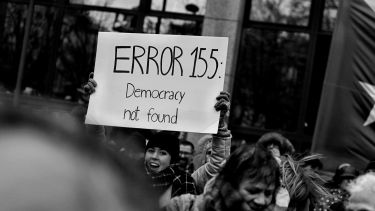The Democracy Cohort 2015-16
The 2015/16 Crook Public Service Fellows worked with The Crick Centre on the theme of Democracy.

Cohort members
Claudia Chwalisz
Claudia was a policy researcher at Policy Network, whilst undertaking her fellowship. She led on the Policy Network and Barrow Cadbury Trust project on ‘Understanding the Populist Signal'. This work focused on the political drivers of populism – disillusionment with political parties, politicians and elections.
It considers if this discontentment can be alleviated through democratic innovations that rely on the principles of random selection and deliberation, and whether involving citizens more directly in political decision-making can help rebuild trust in politics over the long term.
Claudia’s other research concerns welfare state revision and renewal in post-crisis Europe, more specifically how states can alter the underlying distribution of market outcomes to rely less on traditional post hoc redistribution.
She was co-editor with Patrick Diamond of The Predistribution Agenda: Tackling inequality and supporting sustainable growth (I.B. Tauris, July 2015).
Claudia’s Crook Public Service Fellowship at the Crick Centre continued her research into democratic innovations, by piloting a citizens’ assembly. Her book The People's Verdict was released in the May 2017.
Tom Healey
Tom Healey joined the House of Commons Service as a fast-streamer in 1993 and has divided his career between departmental select committees, scrutinising the work of government departments, and procedural work in the Chamber and legislation services. From 2008 to 2011 he was seconded to the Cabinet Secretariat as Parliamentary Adviser.
He returned to the Commons as Clerk of the Home Affairs Committee, and is about to take on a new role in relation to the restoration and renewal of the Palace of Westminster, a major project which could involve the temporary relocation of one or both Houses.
Tom collaborated with Ian Marsh of the Australian National University and Matthew Flinders (Crick Centre Director) on a research project which examined the ways in which Parliamentary committees engage with their various publics.
The research formed the basis of a report to the committees themselves, and a training programme for committee staff.
To see more information and view the report, 'Building public engagement: Options for developing select committee outreach', click here.
Sarah Lyall
Sarah Lyall is a researcher and policy analyst with a focus on social policy, sustainability and participation. She was working with the New Economics Foundation (NEF) whilst undertaking her fellowship.
Her research covers social security, credit and debt, experiences of poverty and inequality in the UK, local responses to austerity and Fairness Commissions.
Sarah’s research project with the Crick Centre ‘The Pursuit of Devolution’ identifies the differing visions of decentralisation and devolution in England emerging from political parties, local government and civil society organisations in order to instigate a debate on what is to be achieved through devolution and what is achievable.
Democracy: the missing link in the devolution debate': full project report (PDF, 282 kb)
Sharon Squires
Sharon Squires was Director of Sheffield First Partnership, whilst undertaking her fellowship. In this role she worked with leaders from across the public, private, voluntary, faith and academic sectors, seeking to build the focus on the city as well as their organisations.
Sharon moved to Sheffield in the 1980s to work as a Probation Officer and then relocated to Nottingham to work as a Senior Probation Officer in Nottinghamshire and Nottingham City. She joined Derby City Council in 1999 to set up Derby Youth Offending Service and was promoted to Director of Derby Stronger and Safer Communities department, responsible for a wide range of services for local communities.
Sharon also worked for the Home Office, leading strategic change programmes, before coming back to Sheffield in April 2010.
Through the Crook Public Service Fellowship, Sharon focussed on emerging trends and approaches to urban leadership and governance, considering the impact of devolution and concepts around the Relational State with the need to develop more innovative and effective ways for local organisations and citizens to work together to improve outcomes for a city.
Sharon's briefing document 'No more standing on the sidelines' is available here.
No more standing on the sidelines: briefing document (Google Drive)
Standing on the sidelines: full project report (PDF, 534 kb)

Experience Sheffield for yourself
The best way to find out what studying at Sheffield is like is to visit us. You'll get a feel for the atmosphere, the people, the campus and the city.
